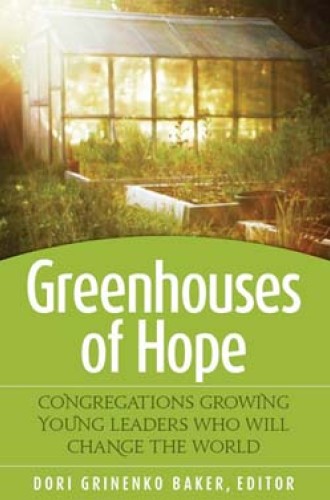Growing youth
Youth ministers have a problem with hope. We tend to confuse it with pluck or treat it as a perky distraction from life's hard realities. Or we simply downgrade Christian hope—the kind born out of God's suffering love for us on the cross—to a Monty Pythonesque reminder to always look on the bright side of life.
One of the chief virtues of Greenhouses of Hope is that it never wanders into the realm of such pious fiction. In this heartening book, Dori Grinenko Baker, scholar-in-residence at the Fund for Theological Education, gathers a team of practical theologians to profile six ministries in which young people experience "vocational flourishing" in churches that attend to the nitty-gritty of growing up in a global culture. The authors' palpable passion for boots-on-the-ground research makes Greenhouses a welcome addition to the growing body of literature on practical theology, ethnography and youth ministry. These theologians also offer mainline Christians a reassuring squeeze of encouragement, reminding us that congregations practice Christian hope with teenagers not only by catechizing them but also by helping them understand themselves as leaders called to "reshape the world."
Read our latest issue or browse back issues.
Greenhouses of Hope immerses us in congregations in which young people "have access to a distinctly Christian hope." Baker calls this distinctive form of hope emancipatory hope-in-action—a mouthful that means "hope that does not abandon the world or seek to perfect it, but does set out to change it." She argues that congregations that nourish young people's vocations have four practices in common: they create hospitable space for young people to explore Christian vocation; they ask self-awakening questions; they reflect theologically on self and community; and they explore and establish ministry opportunities.
The congregations in Greenhouses of Hope ultimately succeed in developing young people as Christian leaders by attending to particular gifts that arise from their own congregational contexts, whether suburban Chicago or the tiny Isle of Hope. The book's most memorable chapters use striking cultural metaphors to reframe traditional Christian practices. "Mozying," for instance, is Sinai Chung's term for the older-to-younger youth mentoring that takes place in a Korean-American congregation. Taken from the Korean word mozie, or sibling, the metaphor reinforces the sense of extended family that is critical to many immigrant congregations.
Jeffery Tribble borrows the Ghanaian word sankofa ("go back and get it") to describe the sacramental overtones of practices in an African-American church that help young people "re-member" their connections to their dual African-American and Christian heritages.
In a refreshing chapter on interfaith dialogue, Baker joins Katherine Turpin in comparing a congregation's radical hospitality to people from other religious traditions to the convivencia of medieval Spain—a period of relative peace among religious groups when Muslim, Jewish, and Christian art and culture freely intermingled. Baker and Turpin believe that a church that practices convivencia can strengthen teenagers' faith identities through conversations with religiously "other" neighbors.
The most hopeful message in Greenhouses of Hope is its implicit one. Reading this book makes it abundantly clear that yours doesn't have to be a large church, a suburban church, a white church, a wealthy church or even a church with an established youth program in order for ministry with young people to flourish. The practices that care for young people's vocations are available in every Christian community. For churches at wit's end about reaching young people, Greenhouses of Hope offers reassurance that growing young disciples is not a one-size-fits-all proposition.
In many ways, this is a book of considerable courage. If you really want to know how the kids are doing, check out Joyce Ann Mercer's chapter on the effects of church conflict on teenagers; you can almost feel the water rise as she wades into two congregations that have been torn over homosexuality. But one of the chief delights of Greenhouses of Hope is its gracious tone, established by Baker in the opening chapter and maintained to the end, in which Melissa Wiginton describes with perceptive clarity the promise these congregations hold for the rest of us. Baker is a particularly engaging and gracious writer, and it is impossible not to feel hopeful as she unfolds her argument. Even her critiques are offered with an appreciative grace.
No book can cover everything, and I suspect that youth ministers will wonder if the focus on "church kids" in this volume narrows its significance in an era in which 25 percent of millennials do not affiliate with any religion. A more important risk may be the book's very slim discussion about what "distinctly Christian" hope looks like. In what—or whom—do these authors think Christians should place our hope? It is not immediately apparent, for instance, how emancipatory hope-in-action is born out of God's "optimism" (as Baker calls it) instead of ours. Each chapter emphasizes teenagers' connections to their congregations and communities, but readers are left to imagine how these young people's emerging vocations are connected to God, or what would prevent the four vocation-nourishing core practices of congregations from devolving into simple self-reflection.
Yet amid sky-is-falling rhetoric surrounding youth ministry and mainline churches in general, Greenhouses of Hope is a welcome change of pace with one unmistakable plumb line: Christian leadership for tomorrow must be shored up and nurtured in young people today. If, as 1 Peter 3:15 admonishes, we should always be ready to account for the hope that is in us, Greenhouses of Hope—for youth and adults alike—is an excellent place to start.







